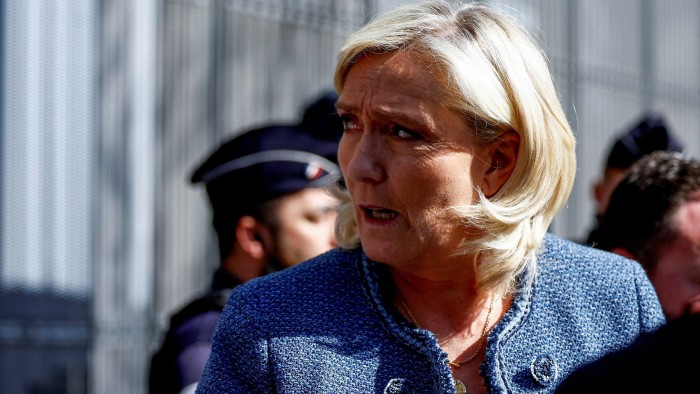This article is an on-site version of our Europe Express newsletter. Premium subscribers can sign up here to get the newsletter delivered every weekday and fortnightly on Saturday morning. Standard subscribers can upgrade to Premium here, or explore all FT newsletters
Good morning. A scoop to start: Denmark’s foreign minister is set to meet the US secretary of state for bilateral talks this week, in the first high-level in-person meeting between the two countries since Donald Trump’s election as president and his demands to “take control” of Greenland.
Today, Laura reports on how Europe’s far right rallied to condemn Marine Le Pen’s embezzlement conviction, and the head of Europe’s biggest party tells me that Brussels is too institutionalised to tackle Donald Trump.
Rallying cry
Europe’s far right rushed to defend their French colleague Marine Le Pen after she was convicted of embezzling EU funds yesterday, branding it a conspiracy to take out one of the continent’s most prominent illiberal figures, writes Laura Dubois.
Context: A Paris court yesterday condemned Le Pen and other former European parliament members for siphoning off about €4.4mn in EU funds, benefiting their Rassemblement National party back in France. The verdict, which Le Pen says she will appeal, is likely to bar her from running for president in 2027.
Prominent far-right politicians were quick to denounce the ruling as anti-democratic, pointing to Le Pen’s record polling numbers in France. “Today, it is not only Marine Le Pen who is being unjustly condemned: it is French democracy that is being executed”, Le Pen’s 29-year-old protégé Jordan Bardella posted on social media platform X.
Some compared the decision to Romania’s recent ban of far-right candidate Călin Georgescu from the country’s presidential race, following a disinformation campaign.
Sławomir Mentzen, who leads Poland’s far-right Confederation party, said it was “the second time after Romania that the system has removed candidates who might pose a threat to it”. Mentzen, whose party is appealing a national decision over alleged funding irregularities, has been climbing in polls ahead of presidential elections in May.
Romania’s new presidential frontrunner George Simion said: “Targeting or annihilating your political opponent by any means is straight out of the instruction manual of totalitarian regimes”.
“This is nuts. Lawfare is wrong whomever it targets”, Greek economist and former politician Yanis Varoufakis wrote on X. “France’s neo-fascists will only benefit from this.”
The backlash highlights the difficulties of enforcing democratic checks and balances on politicians who promote illiberal policies and at times break the law — but are growing increasingly popular, as mirrored by Donald Trump’s assault on the legal system in the US.
“Justice has rightly been served in this case, where the French far right brazenly embezzled funds”, said Transparency International’s EU director Nick Aiossa.
Damian Boeselager, a liberal EU lawmaker, said the verdict “is not a witch-hunt. It’s barring criminals from putting fire to the pyre”. French Liberal MEP Pascal Canfin wrote on X: “The RN had only one thing to do to avoid finding itself in this situation: not cheat.”
Chart du jour: Baby bust

The number of babies born in Italy hit a new low last year, exacerbating the country’s demographic woes.
Brussels ‘monster’
The EU has become an institutional “monster” that is unable to deal with Donald Trump’s onslaught, the secretary-general of the bloc’s biggest political party has warned.
Context: US President Trump is yet to speak with any of the EU’s institutional leaders. A wave of US tariffs is set to hit the EU tomorrow despite diplomatic entreaties by national leaders who have met with Trump.
“The EU has become a monster of hyper-institutionalism”, said Thanasis Bakolas, secretary-general of the centre-right European People’s Party. “It is too institutional to deal with Trump.”
Bakolas, who will step down from the EPP this month to found his own political consultancy, said the EU needed a more “pragmatic political approach”.
“The [EU] institutions are very strong and suck the air out of everything. We can forget in Brussels that we have thousands of officials, with enormous salaries tax-free, who feed off each other and perpetuate this institutional order,” said Bakolas. “How connected are they to real folks? Real people, real businesses? . . . That has a lot of consequences on normal politics in EU countries, outside of the bubble.”
“Trump upended everything. All the uncertainty and questioning caused by Trump has led [European] business to ask itself if it has a voice . . . and it is beginning to understand that this is not the voice they want”, he added.
Bakolas, who was appointed three years ago after serving as a senior adviser to Greek Prime Minister Kyriakos Mitsotakis, steered the EPP to victory in last year’s European elections, in which they won one more seat than in 2019 despite a surge in support for rightwing parties.
That resulted in EPP candidate Ursula von der Leyen being reinstalled as European Commission president for a second term.
“She campaigned, she positioned herself on issues . . . She did it really well, and we won,” Bakolas said. “She made economic competitiveness the key point of the campaign — and she not only meant it, but was right on the money.”
What to watch today
-
German foreign minister Annalena Baerbock and Lithuanian foreign minister Kęstutis Budrys visit Kyiv.
-
College of European commissioners meets in Strasbourg.
Now read these
Are you enjoying Europe Express? Sign up here to have it delivered straight to your inbox every workday at 7am CET and on Saturdays at noon CET. Do tell us what you think, we love to hear from you: [email protected]. Keep up with the latest European stories @FT Europe

